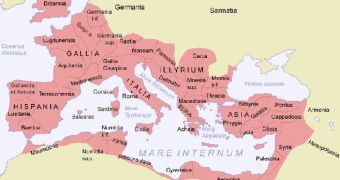When people think about Valentine's Day today, they most likely imagine small cards that convey the warmest feelings of love, focused on the positive aspects of this strong human emotion. But historians argue that people living in Ancient Rome were not as likely to focus on the same aspects. Conversely, they were highly likely to bring out the negative, painful aspects of love in the letters they sent to their loved ones, LiveScience reports. There was no Valentine's Day in the sense we understand it today, but men sent love letters to women, usually married, as well as to other men, on occasions.
Flattery and gratitude were among the last feelings on Roman men's minds when it came to things they thought about writing in their letters. “Unlike what you see in contemporary stores where we have valentines that are all clouds and dreamy and romantic, the Romans had a very different kind of take on love. It's not something that is a good feeling usually; it's something that torments you,” says Hamilton College professor of classics Barbara Gold. She bases her statements on analyses she conducted on old love poems dating back to between the first century BC and the first century AD.
Most of these writings argued that love is an emotion that makes the writer “see double,” and swells up his tongue. They also called love a plague. “You would never go out today and find a valentine that says 'You're like a plague, you set my bone marrow on fire',” Gold adds. These differences are caused by the way in which modern and ancient people looked at love. In Ancient Rome, men or women were rarely expected to love their spouses. “Marriages were arranged, and all about wealth and status and power and keeping the family line going. There never would have been a marriage for the Romans that was based on any kind of [other] attraction,” the expert writes.
She believes that the change in the perception of love our society experiences today may have more to do with the way women are looked at, and integrated. For instance, more than 2,000 years ago, men had all the power in Rome, but they tended to feel insecure, and not in control, when a woman chose to withhold her love as far as they went. Today, when women have more rights and more power in society, men experienced a shift from calling them a plague to accepting them as equal. “The way our society is now, there's a lot better chance of people coming into relationships as equals. We're not living under the same sort of social constraints as the Romans were,” Gold concludes.

 14 DAY TRIAL //
14 DAY TRIAL //